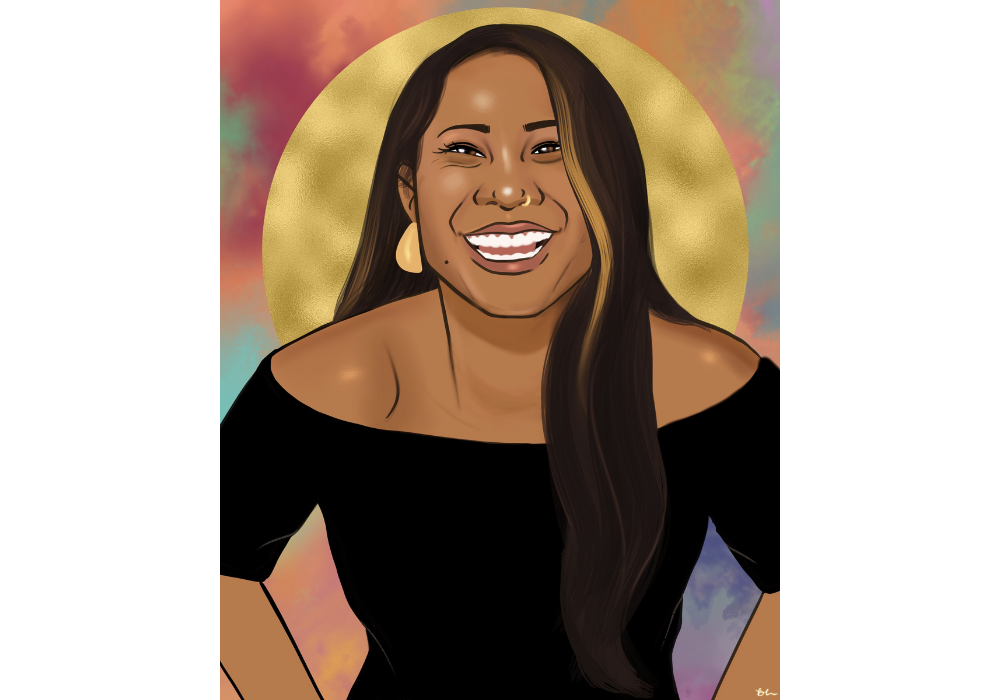An interview with sex educator Justine Ang Fonte

February 14, 2022
Even though I grew up going to public school in Manhattan—one of the few places in this country where young people are lucky enough to receive sex education that goes beyond abstinence—my memories of formal sex ed include little beyond being handed a bag of condoms and told of the imminent dangers of gonorrhea. I learned about sex the way most kids do: reruns of Degrassi, whispered midnight conversations at sleepovers, shitty porn, Tumblr, and fumbling teenage hookups paired with 40s, blunts, and a friend’s free house. When I got my period at eleven, I had no idea what it was, and convinced myself I was gravely ill and headed to my death bed. When, at eighteen, on a visit home from college, my mom found a roll of Trojans in my bag, she broke down and cried. I would never be able to tell her that that college boyfriend wasn’t my first or, more importantly, share with her the joy, possibility, and safety that a true sexual connection had brought to my life.
Most of us spend years, if not lifetimes, unlearning and countering the shame and confusion of early cultural lessons around sexuality. Nationally recognized Filipinx-American sexuality educator Justine Ang Fonte is here to change that as a champion of intersectional sex education. Based in New York City, Justine is dedicated to advancing a sex-positive education that prioritizes consent, safety, and bodily autonomy, an education that begins at an early age and includes critical conversations about gender, identity, race, pleasure, boundaries, self care, and communication.
Justine’s education and advocacy work has garnered her fans as well as skeptics. Last year, she was the subject of a smear campaign led by “concerned parents” at prestigious Manhattan private schools Columbia Grammar and Preparatory School and the Dalton School after teaching topics like porn literacy in her courses. Since leaving that position, she’s looking to spread her message about the power and possibility of radical, inclusive sex ed through children’s books, podcasts, giving talks in and outside of school settings, and consulting for media projects.
I had the pleasure of sitting down with Justine to talk about sex and her upbringing, decolonizing sex ed, how to get in touch with our own desire, and more.
—Senti Sojwal
Senti Sojwal
Tell me a little bit about the work you do and what drew you to becoming a sexuality and intersectional health educator.
Justine Ang Fonte
I started my career as a seventh-grade math teacher, and in my training I was tasked with teaching a summer school class of eighth graders in Houston, Texas, which is an abstinence only state. As I was trying to teach math, I saw directly how the health gap was infringing on academic achievements. I had students in my eighth-grade class who were already parents and who were currently pregnant as I was teaching them. One student in the five weeks I was teaching was absent for two, because she didn’t know that having a period was a normal thing for someone her age. When she returned to school, she told me that she was sick. She didn’t know what to do. She said it happens every month and that she’s “broken down there,” and then I deduce that it was menstruation and ask her, “How long has this been happening?” And she said, “Since I was in sixth grade”. She was sixteen years old, but in eighth grade. She had failed eighth grade two years in a row because she was missing half the school year. She likely had endometriosis, given how much pain she was in. It made sense in her mind why she thought she was sick because it was happening so often. And so in my brief time at that school I experienced how ineffective I can be as a teacher if students aren’t fully present in a classroom.
That’s when I had decided to teach sex ed. I had three days left in the summer school, and I talked to the principal. I had some experience because I had been a peer health educator when I was in high school, and so I had lesson plans. They were super well received. That planted the seed in possibly doing this work in the longer term. I was placed in Hawaii for my two years of teaching and the situations weren’t that different from Texas. So after my teaching program, I got my master’s in education. I decided to pursue a master’s in public health focusing on sexuality.
SS
Most Asian Americans that I know grew up in sex-negative households or had families that just never spoke about sexuality. Many of us hold intergenerational trauma around sex. How did your family deal with sex? What impact did that have on you?
JAF
My family didn’t deal with sex, and I went to Catholic school. I remember there was a class in fifth grade that was called Family Life Education, and it was about the importance of having and growing a family to expand the Catholic community. We were separated by gender. One classmate asked, “I heard boys get boners, what do girls get?” And the response from our female teacher was “periods.” So that was the most “sex ed” I had gotten in school, and at home there was no discussion of sex. I would be watching Nickelodeon and if there was a couple kissing on the screen, my mom would be like, “Turn that off.” If we ever saw people demonstrating any type of public displays of affection my mom would say, “Don’t they have a home?”
So I just knew, kissing is maybe something that’s supposed to be private. But that also there’s something shameful about it, right? So showing affection is wrong. Someone in our extended family had an unplanned pregnancy, and there was no discussion of it except for my parents saying, “God’s will it never happens to you.” That was it. I had my first romantic partner when I was in my junior year of high school. My parents were very much, like, you can’t do this until you’re finished with medical school. I was sixteen—their thought was, if I do this I’m going to lack focus. I lied about my relationship the first year. The second year, I got the support of my brother, and when he was home for the holidays and we were around the table, I told my parents. To them, it was such a surprise. Their story was very much, you’re not going to study and this is going to be a gateway to all these other bad behaviors. And I said, if that is true, I feel like it would have already happened in the last 365 days and you haven’t noticed anything, right? I’m still crushing it at school. Still crushing it at tennis, and still crushing it socially. So, what now? That was a coming-of-age moment for me because it showed my parents, she’s not our little child anymore. She’s clearly making decisions without asking us first. And she’s doing it in such strategic ways.
SS
I love how explicit you are about the importance of building sex ed curriculum that’s explicitly anti-racist. What do you feel like you are responding to in the way sex ed is taught in the mainstream?
JAF
In mainstream sex ed, the message is, you will get a disease, nothing good comes of sex, and you now have less worth as a human being if you engage in some type of sexuality. White supremacy espouses rigidity too—that there’s really only one way to be, that some of us don’t belong, that not everyone is worthy and valid. Mainstream sex ed enforces binary thinking—you’re a boy so you like girls. A nuclear family is the only family. There are only certain “valid” ways to live. That rigidity holds people back from being able to explore safely and freely, and to be their authentic self. This type of sex ed is not fulfilling, it’s not effective, and it’s certainly not joyous.
SS
As a counter to that harm—what does it mean to you to “decolonize” sex ed, and how might we do that for ourselves and our communities?
JAF
It starts with recognizing bodily autonomy as the core pillar of this education, with knowing our body parts and what they do—the right anatomical terms, no shaming. That’s the first step of exercising our own agency and boundaries. Imagine if a six-year-old already had the confidence to say, “I don’t feel like hugs today but we can play with my Legos.” And what that would mean for that six-year-old to become a sixteen-year-old and have that level of assertion skills. And that sixteen-year-old becomes a twenty-six-year-old who is able to say those things to a boss, to a coworker or partner or family member. All of this adds up, because we haven’t been exercising bodily autonomy from the get-go. Why? Because we have been taught that there is power with age, that you don’t have a say when you are young and you have to conform to others’ comfort.
SS
Your education work around boundaries is revelatory to me. We often think of consent as solely physical—“I’m not comfortable doing more than kissing”—but consent is necessary for emotional matters, too, and often that’s a boundary issue. You’re a ghostwriter who people can hire to support them with difficult conversations, often around asserting boundaries, and you document this on your @_good.byes_ IG account. Can you tell me how this project started, and how ghostwriting has had an impact on those who hire you and their relationships?
JAF
This work definitely ties into a health lesson that I have done with my first graders about how to listen to your body. As a child, you have to do things you’re uncomfortable with all the time and have your boundaries crossed because it’s a cultural thing or it’s an expectation. And so we’re used to not listening to our body because we’re told by the outside world, this is what’s expected of you and you have no validity in going against that. We experience our feelings as uncomfortable, so we don’t communicate how we really feel. Instead of listening to what our gut is really telling us, we’ve been so used to catering to somebody else’s needs, in which case boundaries can’t be asserted. In other words, we don’t protect our energy, time, and peace. I’m thinking of that Audre Lorde quote where she says, “Caring for myself is not self-indulgence, it is self-preservation, and that is an act of political warfare.”
I started ghostwriting because I have been someone who listens to their gut, and I have a good skill set when it comes to communication. My friends would tell me that my rejection texts were especially gracious and honest, in a time when most people just ghost. Everyone deserves human connection and dignity, even if you’re rejecting them. When I decided to be single for a bit, I thought I could continue to use that energy to help other people communicate better.
People need to become more comfortable with rejection because this is where learning and growth happens. When someone is rejecting an aspect of you in relation to them, it allows you to really assess yourself. It’s important to ask, did I cross a line? A lot of the messages I write have to do with people going on dates or being in encounters where someone really violated a boundary. It’s often straight men who don’t understand what “no” means, which makes the other person feel disempowered. As a sex educator in the field for more than ten years, it’s been interesting for me now to be “on the ground” with a survivor, for example, to help them with the intention of healing, and for them to experience justice through asserting a boundary by text message. I’m honored to help do that—and the account has gone beyond dating experiences, and extends to family and work experiences. The fact that it’s accrued almost ten thousand followers in one year shows that people struggle with this—they’ve been convinced they need to set a boundary, but they don’t know how. Writing a template for people makes them feel safer and more in control. It’s so close to the liberatory kind of work I do in sex ed, and I’m happy with how much it’s resonated and connected with others.
SS
I see a lot of the platforms that I’m part of whitewashing sex positivity. What does sex positivity mean to you, and how might living and conceiving of a sex positive life be different for people of color?
JAF
Someone can learn what it means to be healthy, but that doesn’t mean they have equal access to being healthy. “Comprehensive” sex ed might look like correctly defining an IUD or implant. But beyond medical accuracy, intersectional health education looks like talking about barriers to access in terms of class, race, gender, and our identities. Whiteness is dominant in sex positivity because we live in a whitewashed world and because whiteness is determined to commodify sex positivity. Capitalism and white supremacy are best friends. A simple definition of sex positivity is positive attitudes about sex, which includes accepting someone not wanting to have sex. But we need to go deeper and examine the barriers to being able to live in a sex-positive world.
SS
It’s always amazing to me how infrequently pleasure is centered in sex education. What are some things we can each do to become more attuned to our own pleasure and desire?
JAF
Again, this is so tied to bodily autonomy. I teach about pleasure in my elementary school classes, but it doesn’t sound like what I would be talking about to an adult, right? It’s about what feels good to you, what makes you happy when you’re alone and you’re feeling low or sad. Some kids will say, playing with my toys, petting my dog, talking to someone. I ask, what happens in your body when you feel that happiness? They might say, it feels like butterflies or excitement or, I feel like I forget all of my other problems when I’m playing with my dog. I ask the same question of sixteen-year-olds: What are the things that make you feel good in your body? Experiencing pleasure begins with having a mastery of how your body works.
When we talk about pleasure, we have to start with our ability to experience it in a range of ways, as a young child all the way to an adult. The reason people don’t explore pleasure or feel like they deserve it is because they’ve been told to silence those parts of themselves. We are taught to prioritize somebody else’s pleasure, but never our own. It’s okay to ask for an orgasm! Understanding pleasure begins with us saying, you have permission to experience it. You have permission to experience joy. And you always did.



